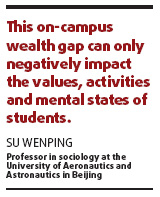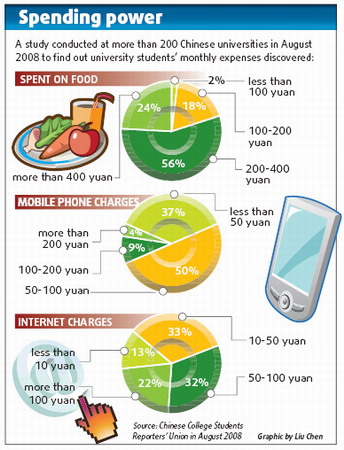Hot on the Web
Growing disparity between rich and poor affects campus life
By He Na (China Daily)
Updated: 2009-10-14 09:36
She explained most students from rich families are extroverted, and active in making friends and taking part in activities. In contrast, poor students often avoid crowds and prefer to be alone.

"When we organize class activities, such as spring outings, most of the participants are usually students from relatively wealthy families," said Li Xue, 23, who studies garment design at Dalian Polytechnic University in Liaoning province. "Even if the trip is funded by the university, poor students still tend not to join in."
Li, whose parents own a heating company, added: "We honesty don't look down on poorer students but they just seem too proud to receive our help. They do not need to be like this. We are just classmates."
In July, 22-year-old Li Li was jailed for robbing a bank on the campus of the Beijing University of Science and Technology and taking a fellow student hostage.
The automation scholar, who hails from a poor village in Jiangxi province, turned to crime when he failed to find a job after running out of money, said police.
His classmates and relatives both said Li Li had very high self-esteem but was ashamed of his poor background.
A study by Professor Su, in which she interviewed students from varying families, showed that 60 percent of poor students felt shame about their backgrounds, while more than 22 percent said they felt inferior.
"They do not want others to know about their situation and they unconsciously turn away when teachers or classmates offer help," said Su, who added that 42 percent of her subjects said they would turn down any form of help if it mean exposing their situation in the media or on the Internet.

"As opposed to senior or middle school, university life has more diverse criteria for 'good' students than simply good grades. But for poor students who are used to gaining self-respect from exam results, it is a big and sudden change in atmosphere. Apart from studying hard, they have little chance to develop other talents or hobbies because of their financial situation," she said.
The obvious wealth gap on campus is a challenge universities have been urged to address.
"We hold meetings for poor students about once a month and try to pay close attention to their behavior, to make sure they are happy and coping well with the pressure," said Dong Jiaomei, who is in charge of student affairs at Dalian Polytechnic University.
"We know each student's financial situation when they enter the university but we never make public the names of those who receive the school's special poverty subsidies, in order to protect students' privacy and self-esteem."
The reasons behind the growing gap between rich and poor in China are legion but to reduce the negative impact requires concerted efforts by the central government, colleges and society as a whole, say experts.
"Although subsidies and allowances for poor students keep increasing year by year, it is still not enough to cover every young person who needs them," said Su. "Government and universities need to improve the subsidy system to ensure needy students get an equal chance at education.
"Most students don't want handouts. They want to make a living with their own hands, so making more part-time jobs and work opportunities available would be the best way to help impoverished students," he added.
A fair job market in which guanxi, or good family connections, had little impact was vital to support them, said Su, "but we can be optimistic as the majority of the employers still favor students with real talents".
Nie Zhenwei, director of the psychology center at Beijing Normal University, also warned those students from rich backgrounds were not immune from the impact of the wealth gap.
"We cannot forget that, by indulging in an affluent life early on, young people often fail to get a good grounding and lose direction," he said. "Learning how to form proper attitudes to life and money is an important lesson at universities for both poor and rich students. We cannot choose the family we were born into, but we can always choose our future."
He said that his college organized many activities for students in the same dormitory to compete in as a unit, allowing rich and poor students to build successful living and working relationships.
"Every semester we also take every opportunity to communicate with parents how important it is they foster rational lifestyles for their children, and keep their feet on the ground," he added.









